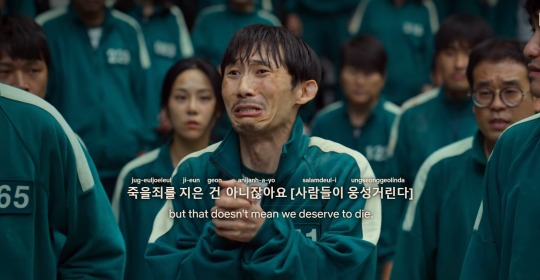#translation analysis

There are many translations within Squid Game which don’t do justice to the original script, and this is one of the most significant for me. After the first game, where the players have realised that losing the game results in their death, player 271 steps forward and pleas ‘우리가 빚을 졌지, 죽을죄를 지은 건 아니잖아요!’ There are two significant phrases here, the first being 빚을 지다 (to be in debt), and the other 죽을 죄를 지었습니다, which has many connotations attached to it.
Firstly, focusing on 죽을 죄를 지었습니다, this is likely a phrase which you have heard before even if you don’t recognise it. 죽을 죄 means unforgiveable sin/crime, and 지었습니다 means to commit. This is a common phrase in historical dramas where someone has to bow down to a member of the royal family or a army general to express their guilt at their actions in the hope of a lenient sentence (even if they’ve done nothing wrong). Someone of a lower class or place within society may also be forced to say it by someone above them as a way to demonstrate power and ‘put them in their place’.
If we look at the phrase as a whole, then, we have ‘yes, we’re in debt, but we haven’t committed some unforgiveable sin/crime. You know that.’ Whilst the translation in the subtitle is similar (we may be in debt, but that doesn’t mean we deserve to die), I feel that this translation points more towards the games being unfair and immoral, rather than the writers’ intention of highlighting the players as good people. Yes, some of the players, such as Jang Deok-su have committed crimes, and are in debt due to their own immoral lifestyles, but many are just unfortunate victims of an unjust society. Seong Gi-hun is an example of this. His character provides a reference to the real-life 2009 Ssangyong Motor strike, where nearly 2,600 workers who occupied the plant for seventy-seven days to protest layoffs were violently beaten down by police. Many of these protestors went to jail, which may be the reason that Gi-hun struggles to find and hold down a good job. As a result, he is desperate for money, especially since he wants to give his daughter expensive gifts. He gambles, and this causes his debt. Ultimately, Gi-hun did nothing wrong. He is a victim of his circumstances, and this is what the writers wanted to highlight - that almost all of the players are unfortunate victims of society, who are victimised yet again through the games. Therefore, ‘we haven’t committed some unforgiveable crime/sin’ is much more fitting to me, even if it isn’t a very natural phrase in English. Maybe the subtitle translator should have gone with something like ‘yes, we’re in debt, but we were pushed into it through no fault of our own. Does that really mean that we deserve to die?’. This highlights the innocence of the players much more.
Themes of unjust society, and the widening of the income gap are incredibly important to Squid Game’s narrative. Some great articles to read to learn more about these themes can be found here:
❥Squid Game lays bare South Korea’s real-life personal debt crisis
https://www.theguardian.com/world/2021/oct/08/squid-game-lays-bare-south-koreas-real-life-personal-debt-crisis
❥Squid Game’s Strike Flashbacks Were Modeled on Our Real-Life Factory Occupation
https://jacobinmag.com/2021/11/squid-game-ssangyong-dragon-motor-strike-south-korea

All of these particles can be used to show that something is being done or given to someone. The difference between these three particles is:
❥ 에게 is used mainly in written communication or formal situations (although it may also be used conversationally sometimes).
❥ 한테 is used mainly in conversation.
❥ 께 is used when talking to or about someone who requires respect (eg. elder/teacher/boss).
These particles come after the recipient, rather than before as they do in English. Here are some examples of their usage:
I gave a present to my friend yesterday.
어제 친구에게 선물을 줬어요.
I send a birthday card to my friend every year.
저는 매년 언니에게 생일 카드를 보냅니다.
My friend gives a watch to their boyfriend.
동생이 남친한테 시계를 줘요.
I want to ask (to) my friend.
저는 친구한테 물어보고 싶어요.
I call (to) my grandma.
할머니께 전화 드려요.
I will give this book to my teacher.
이 잭이 선생님께 드릴 거예요.
Something that is important to note with this grammar is that although it means ‘to’, it can also be used to mean ‘from’. Obviously, this can be confusing, and it can be difficult for learners to figure out how to use this in conversation. When listening to others, however, you can understand which meaning is intended by the context. By listening to native speakers, it becomes easier to understand and use this grammar.
By analysing the Game Administrator’s words, we can grasp which version he is intending to use. He begins with 다시 말씀드리지만 (let me explain again), then states 여러분에게 기회를 드리는 겁니다 or 여러분에게(to you)기회를(an opportunity)드리는(to give) 것입니다(this is). By context, we can understand that he is using the ‘to’ usage. He is saying to the players ‘we are giving you an opportunity’ or ‘this is an opportunity’ with an emphasis on the charitable aspect. Here, 에게 is being used instead of 한테 to indicate the formality of the situation, even though it is being used in spoken conversation.
In this scene, I find that the translation is a little off. ‘Let me remind you’ comes off as passive aggressive and indicates a kind of hostility towards the players which I feel isn’t present in the Korean version. The Game Administrator is still using honorifics, and although his tone is always cold, he actually speaks very politely towards the players. I feel like this would have been translated better as ‘please understand, we are giving you an opportunity’, as this carries the same tone as the Korean version, although it strays slightly from the exact meaning.
